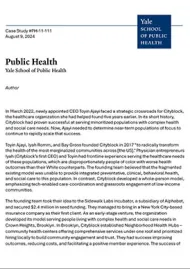NHS England Core20PLUS5 Approach

In December 2020, Lord Simon Stevens, the CEO of NHS England at the time, appointed Professor Bola Owolabi as the Director of Healthcare Inequalities for the NHS England. The COVID-19 pandemic had exposed significant disparities in morbidity and mortality for low-income populations and ethnic minorities. The NHS England understood that to improve health and well-being in the country required a dedicated role focused on healthcare inequalities.
Owolabi gathered information to shape her strategic approach to address health inequalities in England through focus groups and engagement with directors of public health, voluntary sector organizations, NHS England leaders, local authority representatives, trusted advisors and the NHS Assembly. From this process, the Core20PLUS5 approach was born. Launched in November 2021, the NHS England’s Core20PLUS5 approach aimed to reduce health inequalities across England by focusing on specific population groups and clinical priorities.
Owolabi and her team mobilized an ecosystem of collaborators across NHS England, including trusted community partners, through initiatives such as the Core20PLUS5 Ambassador and Connector programs, the Innovation in Health Inequalities Program (InHIP), and the Accelerator Sites initiative.
To address health inequalities, Owolabi and her colleagues understood that social drivers, also referred to as social determinants of health (SDOH), were a significant contributor to health disparities. Even as the approach was gaining momentum, there were open questions about the role of NHS England, a healthcare service delivery agency, in addressing patient needs that extended beyond clinical care. Who was responsible and accountable for outcomes associated with reducing health inequalities in the long term so that the Core20PLUS5 approach was not another short-term initiative that would lose traction if political winds or policy priorities shifted?
On March 13, 2025, Prime Minister Keir Starmer announced that NHS England would be dissolved, and in July 2025 the government released its 10-Year Health Plan with the ambitious goal of halving the gap in healthy life expectancy between the richest and poorest regions. For Owolabi and her team, the question is how Core20PLUS5 should evolve within this shifting landscape. Key questions include:
- What should be the fate of Core20PLUS5 as the system undergoes structural change? Should it be institutionalized within DHSC?
- Can a model developed within the NHS England continue to deliver impact under new governance?
- How should accountability, financing, and leadership be structured to ensure continued progress on reducing health inequalities and integration of clinical and social care?
- As Owolabi and her team prepare recommendations for embedding Core20PLUS5 into the next phase of national reform, what arguments, evidence, and alliances might strengthen the case for its continuation?